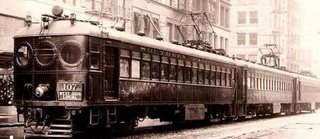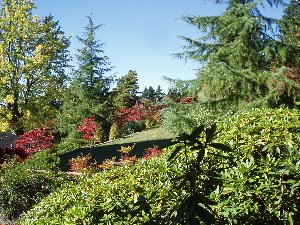
This is the first run of the new Red Electric, named after the Red Electric suburban train that ran through this once rural community of Hillsdale. The cluster of farms and shops was then to the southwest of Portland, Oregon. Now Hillsdale is a vibrant part of the city.
The exact destination of this Red Electric isn't clear. Indeed it may never be "exact." There may not even be a destination per se. For now the Red Electric mostly will run on the familiar tracks of news and commentary about this community tucked into the west hills of Portland. Occasionally, it may be "side-tracked" as the journey demands.
As some of you know, I founded the Southwest Community Connection newspaper (as the "Hillsdale Connection" in July 1994). I sold it in 1999, but I still write a column for the paper each month. As the newspaper was growing in the old medium of print, so was the new technology of the internet.
It is time for me to make the transition from old to new....
My plan is to recreate some of the spirit of the paper here on the web. This blog is a way of getting my feet wet. I hope to learn from the blog format and perhaps eventually evolve into a series of linked websites that serve several Hillsdale Community organizations. They include the Hillsdale Neighborhood Association, our three public schools, the Hillsdale Business and Professional Association, the Hillsdale Farmers Market, the Hillsdale Branch Library, Neighborhood House and the Hillsdale Neighborhood Emergency Team (NET). All are part of what we call "The Hillsdale Alliance."
To get the Red Electric under way, I'm reprinting part of a column I wrote back in March. I hope it attracts some comment....
Portland’s citizens haven’t begun yet to respond to Mayor Potter's invitation to submit visions of the city’s future. Nor has his charter commission reported on how Portland’s archaic commission form of government should be changed.
So it’s a good time to probe just how bold the visioning and reforms ought to be. I’ll offer two ideas—one this month, one in April.
Let’s call the first idea “The New Deal for the Neighborhoods.”
Portland’s neighborhood system is the envy of many cities. At its best, it fosters neighborhood identity and gives citizens legitimate voice in City Hall, particularly on specific land-use issues.
But, frankly, that is pretty much the end of it. Neighborhoods have a say, but not the power to back up their desires.
That powerlessness results in precious few neighbors bothering to get involved in the city’s nearly 100 neighborhood associations.
The only time neighbors turn out in large numbers is when they are irate about some crisis.
Between crises, neighborhood business falls to small cadres left to comment on lot sub-divisions, tree cuttings and the like.
And, if we are honest about it, such neighborhood activists represent only themselves. No one elects them. Their legitimacy is derived from their showing up—while more than a few of us stay home and zone out on “American Idol” or “Dancing with The Stars.”
The result? When important issues come before the City Council or County Commission, their truly elected members have no trouble sweeping aside the views of unelected neighborhood activists.
So what would happen if, under this “new deal,” the City turned over real power to the neighborhoods? What, for instance, would happen if a small portion of tax revenues derived from the neighborhoods was returned directly to each neighborhood? What if neighborhoods were required to respond with elected governing bodies that were truly responsive to and representative of local residents and their concerns?
With real decision-making power, elective legitimacy and modest neighborhood “revenue sharing” to make things happen, neighbors would get involved in their neighborhoods. The new deal might well transform our loosely defined places into true communities.
City and County officials might find all this a bit threatening, but why should they? Reduced to being mere taxpayers and voters, we are rarely called on to be fully engaged citizens. In our minimalist roles, we are of little help to elected officials. Indeed we are often seen as threats. But if we can be engaged at the neighborhood level through local power-and revenue-sharing, we become partners and true citizens. Portland—the city—would become a community of communities, rather than a rag-tag collection of powerless places overseen by know-it-all city officials.
 Today's message to boomers....
Today's message to boomers....

